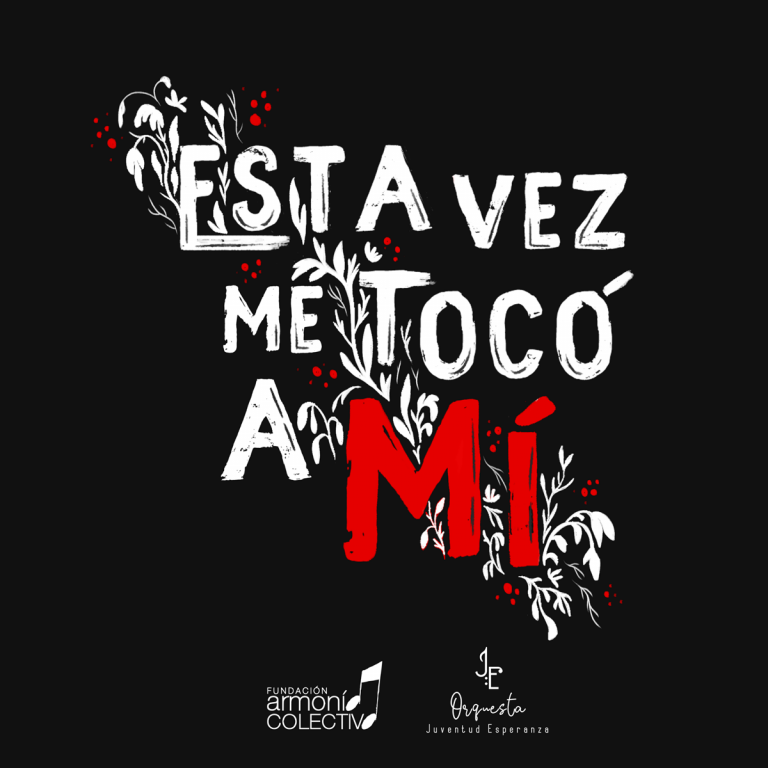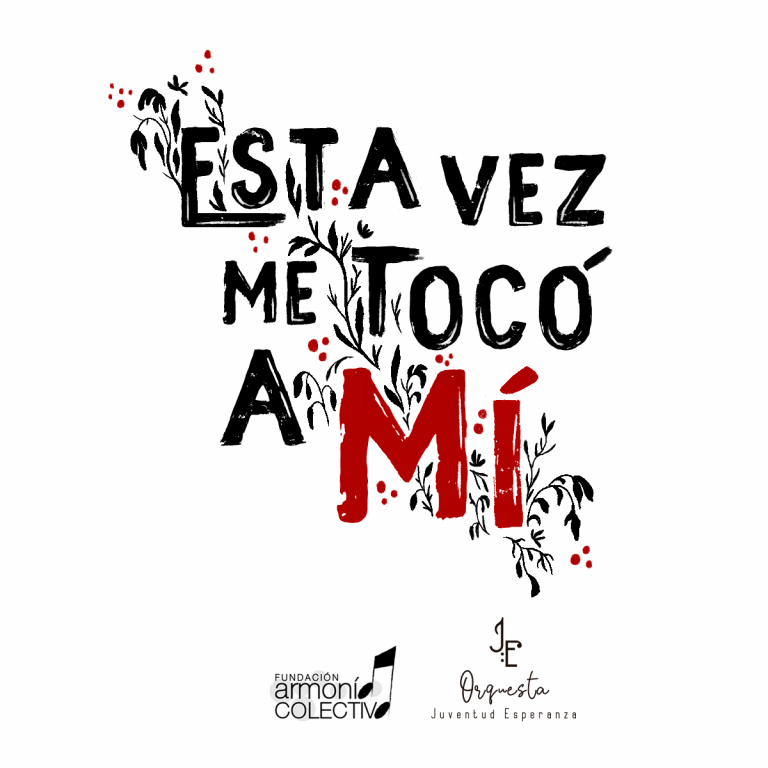INITIATIVE
Listen to our song and learn more about the International Day for the Elimination of Violence against Women








Manifesto
"Fundación Armonía Colectiva and the students of the Orquesta Juventud Esperanza, through the initiative "Esta vez me tocó a mí" (It Happened To Me This Time), express their rejection and concern for acts of violence against women. Through the music and lyrics of the song "Esta vez me tocó a mí", we express the reality of violence that women live with on a daily basis in our country and the world. That is why we urge all sectors of society to join this call, to say enough is enough, and to condemn any act of violence. We do this working collectively and individually from our homes, public spaces, work spaces, artistic initiatives, religious groups and public policies. We aim for a just world, where women can walk freely, safely and without fear, knowing that they will return home alive."
SONG
"Esta vez me tocó a mí" (It Happened To Me This Time)
Lyrics (English Translation)
Our souls burn with pain and fury,
Before a world immersed in indifference,
Victims of abuse and femicides on the loose,
Latent minimization and deep fear.
From the ashes we rise, united in the struggle,
For our sisters who today are not heard.
Creating alliances, intertwining experiences,
Reclaiming empathy, equity and consciousness.
"Esta vez me tocó a mí" is a song composed by the Orquesta Juventud Esperanza (OJE), whose lyrics were written by the students of the orchestra and whose music was developed collectively by all the members of the orchestra. The musical arrangement was made by José Soto, founder of the Fundación Armonía Colectiva (FUNDARC) and teacher in the OJE.
The song arose from a conversation about a case of sexual abuse that occurred in the Costa Rican music scene. This led the OJE students to talk about their experiences related to the sexual harassment that women suffer daily, the many “survival methods” that they use to feel safe and make it home alive, and also to share the indignation and helplessness generated by the fact that most cases of violence, abuse and sexual harassment go unpunished.
This conversation also motivated an epiphany in the women of the foundation as they discussed and became aware of the flurry of thoughts and fears that they experience when they feel in danger, and how these are also shared by many women in Costa Rica and the world. These fears and thoughts are the ones that are shown throughout the song, which reflects the frustration of how this problem is often perceived as something “normal” in our society.
Therefore, all the members of Fundación Armonía Colectiva and Orquesta Juventud Esperanza agreed on the importance of recording and publishing the song as a way to make themselves heard and highlight the problem of violence against women within a patriarchal society. In this way, through the message of the song and the creation of this space with informative resources, we invite the population to question all sexist attitudes that continue to exist to this day.
At Fundación Armonía Colectiva we believe that music and art are an antidote to this and other social problems that we face in our daily lives.
General Objective
- To make the social problems of violence experienced by women in their daily lives visible through a musical composition and the production of a video clip that promotes awareness and reflection on this issue.
Specific Objectives
- To create spaces for reflection and the exchange of information to raise awareness about the different ramifications of this problem and how to deal with them effectively.
-
Disseminate information about collectives and entities that support the movement.

RESOURCES FOR INFORMATION
Where do I go if I am a victim of violence? How do I know if I am a victim of violence? How can I learn more?
Emergency Contacts
Protocol for Complaints
Statistics
Self-assessment
Books and Articles (Texts in Spanish)
Contactos en casos de Emergencias
- Report situations of violence to the Emergency Service: Emergency hotline 9-1-1. Centro Operativo de Atención a la Violencia Intrafamiliar (Operative Attention Center for Domestic Violence) (COAVIF) https://www.inamu.go.cr/linea-de-emergencia-911
- Violence against minors: PANI. Report online: https://pani.go.cr/servicios/denuncias-en-linea
- Support line for men: Instituto Wëm - Prevention of violence through the promotion of positive masculinity. Telephone number: 2234-2711 / 911 (Ask to be transferred to the support line). Hours: Monday – Friday from 10:00 a.m. to 4:00 p.m.
- Support groups and other services: https://www.institutowemcr.org/index.php
Protocol for Complaints
- Sexual Harassment in the Workplace: http://www.mtss.go.cr/tramites-servicios/catalogo-tramites/denuncias.html
- MEP (Ministry of Public Education). Protocol of Action in Situations of Physical, Psychological, Sexual Violence, Harassment and Sexual Harassment: https://www.mep.go.cr/sites/default/files/protocolo-situaciones-violencia.pdf http://www.mep.go.cr/sites/default/files/brochure-contra-hostigamiento-sexual.pdf
- Street Harassment: how to report it? https://www.presidencia.go.cr/comunicados/2020/08/firmada-ley-contra-acoso-sexual-callejero/
- Cyberbullying: https://www.unicef.org/es/end-violence/ciberacoso-que-es-y-como-detenerlo https://www.panoramadigital.co.cr/pani-alto-al-ciberbullying/
Statistics
- Femicide: https://tinyurl.com/2ktjrep5
- Sexual Crimes: https://tinyurl.com/3u498rjk
- Violence against Women in the COVID-19 Pandemic: https://tinyurl.com/2jjx38pu https://tinyurl.com/bn8kt9pv https://tinyurl.com/cbpsjnk
Self-assessment: Am I a Victim?
- Observatorio de Violencia de Género Contra las Mujeres y Acceso a la Justicia (Observatory on Gender Violence Against Women and Access to Justice): https://observatoriodegenero.poder-judicial.go.cr/index.php/soy-mujer-y-busco/guias-para-identificar-la-violencia/soy-una-victima
Books and Articles (Texts in Spanish)
- Mora, Mariana R. (2019). Recordar-LAS. Cartografía de Femicidios Costa Rica. (Read)
- Mora, Mariana R. (2019). Cartografías del femicidio en Costa Rica: trazos de una violencia cotidiana. Istmo. Revista virtual de estudios literarios y culturales centroamericanos 38 (2019) : 149-170. (Read)
- Nieves, María R. (1996). Violencia de Género: Un Problema de Derechos Humanos. CEPAL, Serie Mujer y Desarrollo. 1564-4170. (Read)
- Hernandez, Iyamira. (2014). Violencia de género: Una mirada desde la sociología. Instituto Cubano del Libro, Editorial Científico-Técnica. (Read)
Some concepts you should know
Gender-Based Violence
Sexual Violence
Sexual Abuse
Sexual Harassment
Hostigamiento Sexual
Gender-Based Violence
-
"Violence that is directed at an individual based on their gender, including acts of physical, mental and sexual violence, and/or threats related to the above." Definition according to Convention on the Elimination of All Forms of Discrimination against Women” (The Convention on the Elimination of All Forms of Discrimination against Women [CEDAW], 1992).
-
"The term gender-based violence is used to distinguish common violence from that which targets groups of individuals based on their gender." (UN Commissioner for Refugees, 2003).
Sexual Violence
Domestic violence is any situation of physical, psychological, sexual or patrimonial mistreatment, in which the person who carries out the violent act has or had a relationship of consanguinity, affinity or adoption with the assaulted person.
In Costa Rica, since 1996, through the Law Against Domestic Violence, mothers, children, persons of sixty years of age or older, with disabilities, and victims of violence in intimate relationships may request protection measures that guarantee their life, integrity, and dignity. These are called protection measures. (Observatory of Gender Violence and Access to Justice, Judiciary Power).
Sexual Abuse
"Unwanted sexual activity perpetrated using violence, threats, and/or taking advantage of the victim's lack of capacity to give consent" (American Psychological Association [APA], 2000).
Sexual Harassment
"Behavior based on sex, of an unpleasant and offensive nature for the person who suffers it. For it to be sexual harassment, the confluence of both negative aspects is necessary: unwanted and offensive". (ILO, 2013).
"Sexual harassment can occur within the framework of hierarchical relationships, between peers and between persons of the same or different sex, between acquaintances or strangers, and between those who have or do not have an amorous bond; both in the dependencies of the higher education institution and outside them, regardless of the circumstance or occasion in which these conducts are carried out." (Gutiérrez, 2016).
Hostigamiento Sexual
-
"Sexual harassment includes conduct of a sexual tone such as physical contact and innuendo, sexual remarks, exhibition of pornography and sexual demands, whether verbal or in law. Such conduct can be humiliating and can constitute a health and safety problem; it is discriminatory when the woman has sufficient reason to believe that her refusal could cause her problems in relation to her work, including recruitment or promotion, or when it creates a hostile working environment." (Salas, Ramirez, Ugalde, Larralde, 2007).
-
"Sexual harassment includes conduct of a sexual tone such as physical contact and innuendo, sexual remarks, exhibition of pornography and sexual demands, whether verbal or in law. Such conduct can be humiliating and can constitute a health and safety problem; it is discriminatory when the woman has sufficient reason to believe that her refusal could cause her problems in relation to her work, including recruitment or promotion, or when it creates a hostile working environment." (CEDAW, 1992)
Other Resources for Information
Roundtable:
"A Reflective Look at Gender Violence".
November 25
Roundtable held on November 25, in commemoration of the International Day for the Elimination of Violence against Women.
Guests: Nadya Blanco Guzmán and Kattia Castro Flores.
Moderator: María Amalia Quesada.
Article:
"Listening with love, Part 3: It Happened to Me This Time."

Written by Kat Peters
Feb 18 - 8 Min. read
The song made me think about our trade-offs, what we give up when we have these coping mechanisms and internal monologues, instead of being able to say out loud what we feel...
TEAM



